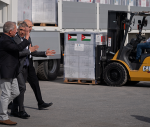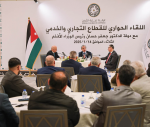You are here
The Iranian opportunity
May 23,2017 - Last updated at May 23,2017
Last week, the people of Iran decided to continue along the path toward openness.
Sixty-two per cent of voters chose to elect the reformist President Hassan Rouhani to a second term.
The rest of the world should welcome Rouhani’s victory as an opportunity further to improve relations with a country that is central to progress towards a more peaceful Middle East.
By winning more than 50 per cent of the vote, Rouhani avoided a second round of voting, just as he did four years ago when he claimed the presidency for the first time.
But, unlike in 2013, when his overwhelming victory was a major surprise, most observers considered Rouhani the clear favourite this time around.
After all, every Iranian president since 1981 has served two terms in office.
Rouhani’s triumph was likely, but the vote was no mere formality.
His main opponent, the hardline conservative Hojatoleslam Ebrahim Raisi, campaigned hard, and had Iran’s Supreme Leader Ayatollah Ali Khamenei implicitly in his corner.
Rouhani’s victory has proven once again that the candidate closest to the supreme leader is not guaranteed victory.
The stakes of this election were particularly high.
Iran is at a pivotal moment in its history — and, as the long lines of citizens eager to cast their votes clearly showed, Iranians know it.
Indeed, despite the Iranian regime’s lack of transparency, Khamenei’s health problems are public knowledge.
Khamenei himself recently admitted that the probability that his successor should be named in the near future was “not low”.
The matter of who occupies the presidency during that transition is no trifling matter.
With Khamenei having served as president before rising to Iran’s highest political and religious leadership position, it is easy to see that the conservative candidate Raisi, had he been elected, could have become Khamenei’s successor.
Rouhani’s decisive victory, however, may have diminished Raisi’s chances substantially.
Iran’s prospects look quite different with Rouhani in charge.
His rhetoric about openness is not mere political posturing.
Perhaps the strongest evidence of this is the nuclear deal that he struck with six countries — China, France, Germany, Russia, the United Kingdom and the United States — in 2015.
That agreement placed very strict limits on Iran’s nuclear programme, in exchange for relief from crippling economic sanctions imposed by the US, the European Union and the United Nations Security Council.
To be sure, Iran’s president is subordinate to the supreme leader. And, indeed, the nuclear agreement could not have been reached without Khamenei’s approval, which helps explain why no candidate questioned the deal during the campaign.
Nonetheless, the president does wield significant authority, including over domestic policy, which was the main focus of the campaign (as is usually the case in Iran).
In particular, Rouhani and Raisi attempted to distinguish themselves by their very different interpretations of the nuclear agreement’s domestic economic impact.
Rouhani credited the agreement with jump-starting economic growth, which now stands at around 7 per cent annually.
His detractors, however, claimed that this growth mainly reflected higher oil exports, and pointed out that it has not trickled down to all levels of society, leaving many Iranian households still suffering from poverty and unemployment.
Khamenei, too, has been very critical of Rouhani’s economic policy, calling for a much more autarkic approach. But Rouhani’s interpretation of Iran’s challenges is far more convincing.
Increased openness has, in fact, greatly benefited Iran. What is holding the country back are the remaining barriers surrounding its economy, including Iran’s isolation from the global financial system, which contributes to a chronic and damaging shortage of credit.
The bad news is that US President Donald Trump, who opposed the nuclear deal during his campaign, and the Republican-dominated US Congress have taken a hardline stance towards Iran, and are discouraging investment in the country.
This gives political succour to those who accuse Rouhani of being naive to hope that the international community would welcome a more open Iran.
Among these sceptics are the conservatives Raisi represented, who regard the West with suspicion.
Had Raisi won, mutual distrust between the US and Iran could well have boiled over, despite Raisi’s stated support for the nuclear deal.
Rouhani’s victory, however, might help temper the Trump administration’s anti-Iran rhetoric.
Just a few weeks ago, in fact, the administration was forced to admit that Rouhani is fulfilling its part of the nuclear deal.
Indeed, Iranians’ show of popular support for Rouhani provides the best guarantee that the spirit behind the nuclear deal will remain unchanged.
But Trump will not make it easy for Rouhani. In order to ensure that Iran continues progressing towards international engagement — thereby protecting a nuclear agreement that Trump is not eager to defend — Rouhani’s government will have to work hard to improve relations with neighbouring countries.
Moreover, it will need to adopt a more constructive position vis-à-vis the Syrian conflict, making it clear that Iran is not spearheading a Shiite liberation movement.
On the day Iranians went to the polls, Trump was making his way to Saudi Arabia — a remarkable choice for his first official foreign trip.
Let us hope that his brief visit to the Middle East helps to create favourable conditions for progress towards peace in the region.
Iran has sent a powerful signal on that front. It is an opportunity that should not be squandered.
The writer was EU high representative for foreign and security policy, secretary-general of NATO, and foreign minister of Spain. He is currently president of the ESADE Centre for Global Economy and Geopolitics and distinguished fellow at the Brookings Institution. ©Project Syndicate, 2017. www.project-syndicate.org












